Kyiv, Ukraine – Right after setting foot in the cafeteria named after Donald Trump in the Ukrainian capital, visitors see the most anti-Russian paraphrase of the United States president-elect’s best-known war cry.
Inspired by Trump’s “Make America Great Again” motto, an illuminated “Make Russia Small Again” sign shines above a display of cakes and doughnuts.
Most Ukrainians would love to see their arch-enemy reduced to its centuries-old size of a tiny principality around Moscow.
But their views on Trump’s ability to belittle Russia, stop or freeze the war and pave the way for Kyiv’s membership in NATO and the European Union vary from rosy optimism to gloomy naysaying.
The “Trump” cafeteria’s manager believes that his idol’s “uncompromising” political tactics and business acumen will help end the war promptly.
“Considering his style on the political arena and his way of conducting business, I think he’ll be quite careful, but will make brave steps to settle this crisis,” Roman Kravtsov, a bearded 27-year-old, told Al Jazeera.
Advertisement
“He’s a man of his word. He acts right away. He is quite an uncompromising guy,” said Kravtsov, who hails from the eastern Ukrainian city of Donetsk which has been controlled by pro-Russian separatists since 2014.
Kravtsov, who dreams of Trump visiting his cafeteria, wants to pick his brain about the art of business deals.
But he worries that Ukraine hardly tops Trump’s agenda.
“I’m not sure that Ukraine’s matters are even in his top five” list of priorities, he said.

‘There isn’t more ammunition’
Ukrainian President Volodymyr Zelenskyy said that he expects “strong” security guarantees from Trump ahead of any peace deal.
“We want to end [the war] with a just peace, and for that, we need to be certain that Russia won’t return again with a war against Ukraine. We need strong security guarantees,” he said on Wednesday.
However, to some Ukrainian servicemen on the war’s front lines, Trump epitomises the collective West’s perennial failure to restrain Russia.
In 2014, Moscow annexed Crimea and backed separatist forces – but Western sanctions did not see Russian President Vladimir Putin back down.
In 2022, when the full-scale invasion of Ukraine began, the West pledged to supply Kyiv with missiles, tanks, artillery, ammunition and fighter jets.
But the delivery of almost every item was delayed, resulting in lost opportunities to regain occupied territory and countless casualties, according to Ukrainian troops and observers.
Only a handful of F-16 fighter jets landed in Ukraine last summer after years of promises and deliberations.
“We needed the planes when we counterattacked [in early 2023], when we had the manpower, when we had the ammo,” a Ukrainian serviceman who remains on the front line despite severe wounds, told Al Jazeera.
Advertisement
Because of Trump’s pressure on Republican congressmen, a $61bn US aid package was stalled for months and was only approved in April 2024.
The delay cost Ukraine thousands of lives, while Russian forces regained the initiative and kept advancing in the east, albeit slowly and with harrowing losses, the serviceman said.
“Lives have been lost, there’s fewer people fighting, but there isn’t more ammunition. That’s why [the Russians] keep pushing,” the serviceman said.
Trump has repeatedly said that he would end the war “in 24 hours,” but never detailed his plan.
His team, however, hinted that he may let Russia hold on to occupied chunks of four Ukrainian regions plus Crimea.
They also may insist on a ban on Ukraine’s membership in NATO for years or decades.
‘No way’ Ukraine can push Russia back: Rubio
Marco Rubio, whom Trump picked as secretary of state, said on Wednesday that both Russia and Ukraine would need to make “concessions” – and that Moscow may keep the occupied areas.
“There’s no way Ukraine is also going to push these people all the way back to where they were on the eve of the invasion,” Rubio said.
And after months of silence about his “peace plan”, Trump “will have to come clean,” says Lieutenant General Ihor Romanenko, former deputy head of the General Staff of the Ukrainian Armed Forces.
“Now is the time to show responsibility for his words,” he told Al Jazeera.
Romanenko is confident that Trump’s “24-hour plan” is most likely to morph into a “very difficult process that would take up to six months”.
Advertisement
A ban on Kyiv’s membership in NATO and the EU might trigger a crisis among pro-Western politicians in Ukraine who have for decades urged their voters to abandon Moscow-dominated blocs.
A months-long, violent popular revolt ousted pro-Russian President Viktor Yanukovych in 2014 after he agreed to join a free trade zone with Russia.
Ukraine’s pro-Western agenda was largely based on the assumption that the inevitable NATO membership “solves our security problems, and the EU handles our economic development”, Kyiv-based analyst Aleksey Kusch told Al Jazeera.
The aspirations were “a mantra of pro-Western liberal democrats [who urged Ukrainians to] ‘vote for us, and we will soon lead Ukraine to the EU and NATO,’” he said.
Front-line battles
Ahead of Trump’s inauguration, Ukrainian troops keep losing ground on the eastern front and cannot expand the tiny area under their control in the western Russian region of Kursk.
“And that will very negatively show the new US administration our ability to defend ourselves,” Yuri Butusov, a journalist-turned-serviceman wrote on Facebook on Wednesday.
On Tuesday night, however, Kyiv conducted its largest drone attack on Russian military infrastructure involving more than 200 unmanned aircraft.
For the first time, they carried gliding bombs that were released just kilometres before the drones reached their targets.
The attack damaged fuel depots and oil refineries in the Volga river region that produce a rare brand of fuel for Russian strategic bombers that launch missiles at Ukraine.
Advertisement
“That’s why strikes on the refineries that produce it are so important,” military analyst Pavlo Narozny said in televised remarks.


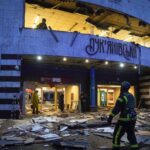
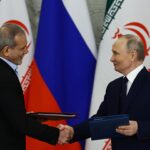
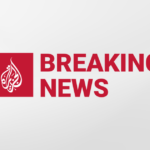
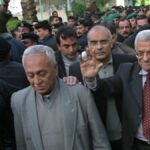
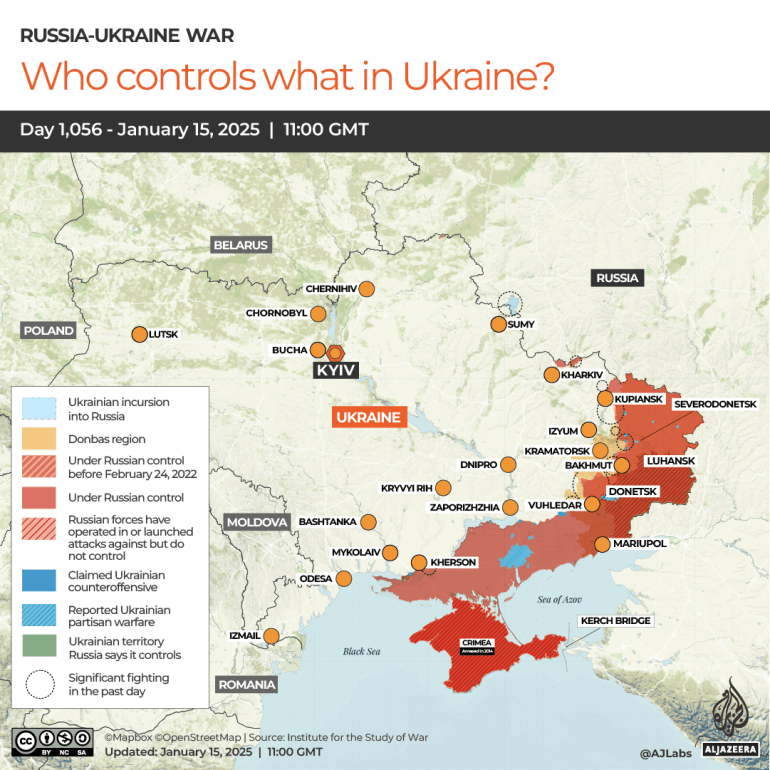

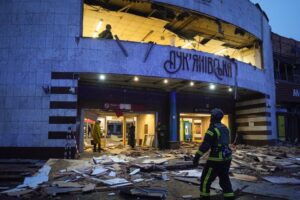
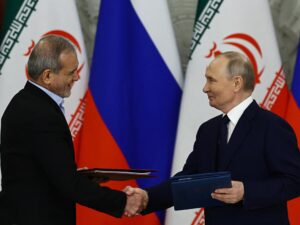
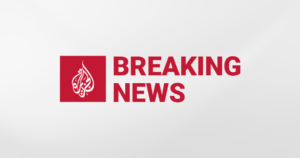
More Stories
What is ‘Dreams on a Pillow’, the Palestinian game about the Nakba?
Four killed in Russian drone and missile attack on Ukraine’s Kyiv
Analysis: Russia, Iran strengthen alliance after Syria setback